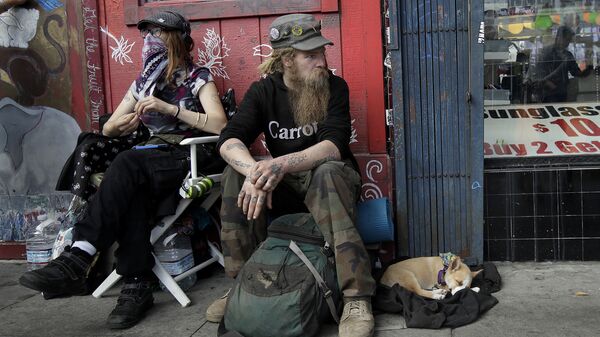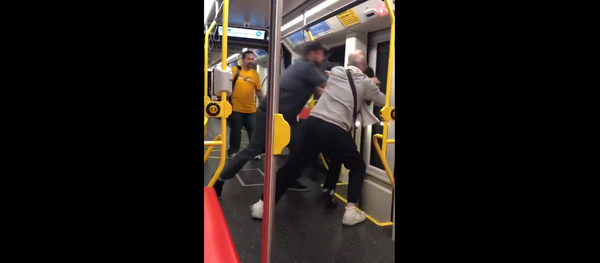Out in the Street
Homelessness has been a major issue in San Francisco for several decades, but it is the heat of the midterm election race that gave birth to Proposition C, a contentious initiative designed to generate more money for providing the homeless with services by increasing the gross receipts of big businesses. Now, Prop C is on the ballot for San Francisco voters, and it needs two-thirds of the votes to pass.
San Francisco has a large homeless population (around 7,500 as of 2017, one of the biggest homeless populations in the US). They have been accused of littering the city with trash, discarded syringes and public depositing of human waste. Nearly 2,900 people (39 percent of San Francisco's homeless population) are considered by the city's Public Health Department to be mentally ill. In recent months, San Francisco has seen an uptick in violence and crimes committed by homeless people with mental issues.
READ MORE: Sputnik Looks at 3 Major Reasons for LA Homelessness and 'Off-the-Rails Poverty'
This situation hardly improves the local quality of life, and raises safety concerns among both officials and local citizens. "When I was working at a retail store in downtown, we constantly had to be on the lookout for the homeless usuals that were known for stealing," Anthony Budanov, a local student, told Sputnik. "I personally don't know how much the homeless affect the crime rate in San Francisco, but through my experience I can definitely say that some of the homeless population add to it. Some nights walking up Market Street I'd have to hold my breath due to the horrid stench of human excrement."
Tax the Rich, Feed the Poor
The Robin Hood-style Proposition C, also known as Our City Our Home, is a state ballot measure that has emerged in response to this unsettling environment that the authors say can root out the homelessness crisis. It would impose a tax on the 300-400 largest businesses in San Francisco (companies with more than $50 million in gross receipts) to generate from $250 to 300 million per year. On top of the existing funding, it promises some $700 million per year for homeless funding needs.
At least half of the proposed tax revenues would be channeled to permanent housing expenditures, including rental subsidies as well as the construction and operation of permanent government housing. The rest would be spent on mental health services, homeless shelters, and homelessness prevention measures.
Jennifer Friedenbach, executive director of Coalition on Homelessness, one of the main masterminds behind Prop C, prioritizes housing above everything else. "Our primary objective is to address homelessness. Once homeless people are housed, they are able to address their employment issues. [It's] hard to get a job when you are homeless," she told Sputnik.
'Tons of Jobs' for Homeless People
Sonja Trauss, a candidate for supervisor of District 6, which has the largest homeless population in the city (3,680, or 49 percent, according to government statistics), has said to Sputnik that finding a job for homeless people is not a problem.
"Housing is where jobs plead at night. We don't have enough housing. Everybody who is able to work can find a job. Many people who are homeless have jobs. Jobs are not an issue. We have tons of jobs!"
According to official data, shy of 40 percent of San Francisco's homeless population are mentally ill and thus are entitled to welfare benefits, but the rest apparently lack the necessary qualifications, effectively raising the question, who is going to hire them?
Tony Kelly, a candidate for supervisor in San Francisco's District 10, says that city hall fails to answer what's going to happen to homeless-turned-employees.
"I don't believe the government is doing this well," he said in a comment to Sputnik. "Our city spends tens of millions of dollars each year on job training, but has trouble proving that people actually find and retain jobs in their programs."
'Breaking Point' for New Businesses
Although Prop C is popular among local proponents of social justice, it could have an adverse impact on companies working in the city, San Francisco mayor London Breed says. She has argued that Prop C "lacks accountability" and "could make our homelessness problem worse."
"Just to be clear: it's important that big companies making a lot of money in San Francisco pay their fair share. What I'm most concerned about is possibly the unintended consequences-on retail, on manufacturing and other businesses that don't make multi-billion dollars," she said.
This echoes the concerns of tech companies Square, Stripe, Lyft, Visa, Macy's and Square, who've all donated to the "No to the Prop C" campaign, backed by the San Francisco Chamber of Commerce.
READ MORE: Deja Vote: Polls Again Useless in Determining Outcome of Key California Races
Big businesses argue that the "ill-conceived" Prop C doesn't give the new mayor a chance to put into action her own plan in the first place, and could aggravate the homelessness problem.
Jack Dorsey, the founder of both Square and Twitter, has earlier indicated that the tax ballot measure could become an unbearable burden for some companies and could eventually drive them out of San Francisco.
In a written comment to Sputnik, Richie Greenberg, a former Republican San Francisco mayoral candidate, said that the proposed tax could become a "breaking point" for newer tech companies that "aren't earning that much profit," prompting them to abandon the city and move to other, more favorable states — Texas, for example.
'The Money Isn't the Problem'
Greenberg, who also ran for District 1 supervisor in November 2016, claims that despite the eye-watering amounts of cash spent on homelessness services (roughly $380 million in 2017), the problem didn't go away due to poor management, and extra funds will not bring relief.
"The money is not the problem but how the money is being spent, and what departments and organizations this money is going to. We have 7,000 homeless individuals living here. It's way too much money already for just 7,000!"
A measure that could improve the government efforts is an audit of the agencies that spend the money, he stressed. Another thing is to eliminate the provision of money to organizations that waste the taxpayers' dollars.
Greenberg claims that this "humanitarian disaster" has stemmed from the decades-long Democratic monopoly in California, which is widely considered a deep-blue state.
"In San Francisco, there has not been a Republican leadership or representation for nearly 50 years. Us Republicans would have an entirely different approach, a responsible, fiscally conservative and realistic plan for the issues we face. The Democrats wish to tax and tax and grab as much money as they can, for no good reason or good use. In fact, we know they are not Democrats, but Socialists."




